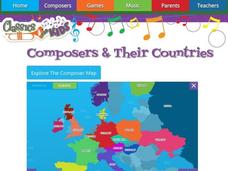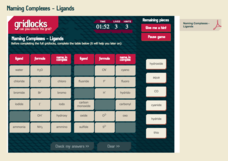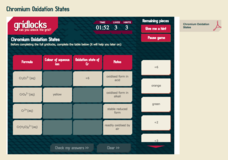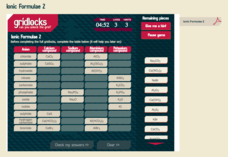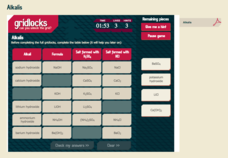Royal Society of Chemistry
Units of Volume
Did you know in the UK a quart is smaller than in America? This explains why a standard unit of measure is necessary for volume. Young scientists learn the similarities and differences between five different units used to measure volume....
US Civil Rights Trail
Explore the Civil Rights Trail—Interactive Map
An interactive map equipped with images, text, and clickable links takes history buffs on a journey through the Civil Rights trail. Scholars discovery locations including Atlanta, Georgia, Jackson, and Mississippi as part of an...
Classics for Kids
Composers Timeline
Take a quick tour through the last 350 years of music composition with an interactive timeline tool. As learners scroll through the years, they see which composers were born and working during the Baroque, Classical, Romantic, and Modern...
Classics for Kids
Composers and Their Countries
How many of the world's greatest composers were born in Austria? Or Germany? Or the United States? An interactive map provides young musicians with information about prominent composers in the last few centuries, as well as the periods...
Royal Society of Chemistry
Shapes of Molecules—Geometry of Central Atom
How is a molecule's shape determined? Explore bond angles, lone pairs, and VSEPR theory through a logic-based activity. Chemists pull together information about the major molecular shapes, then use it to solve puzzles.
Royal Society of Chemistry
Organic Names—Functional Groups
Worried that your lesson plan about functional groups is dysfunctional? Liven things up with interactive puzzles! Curious chemists arrange functional groups based on name, formula, suffix, and an example. The challenge begins when the...
Royal Society of Chemistry
Naming Esters
Do your chemistry scholars know their esters? Introduce the class to the nomenclature and structural formulas of common esters through thought-provoking games. Individuals or pairs of pupils match the name with the formula before using...
Royal Society of Chemistry
Naming Complexes—Ligands
Naming complexes can be, well, pretty complex! Simplify a study of ligands using interactive puzzles. Junior chemists match up the name, formula, and complex name, then solve a series of logic games with the information.
Royal Society of Chemistry
Moles Equations (16-19)
How many calculations can you think of that include moles? Chances are, plenty! Show young chemists the uses of the multifaceted mole with thought-provoking puzzles. Individuals identify and associate the outcomes of molar quantities...
Royal Society of Chemistry
Isomers of (E)-but-2-ene
One chemical formula—but how many different structures? Familiarize young chemists with the concept of isomers through simple, related games. Users identify each isomer base upon its name, structure, and type of isomerization in a set of...
Royal Society of Chemistry
Halide Ion Tests
Young chemists love it when colorful solid products appear in a reaction vessel! Scholars discover the products that form during halide ion tests through a hands-on activity. Users go online and apply chemistry knowledge and reasoning...
Royal Society of Chemistry
Functional Groups
Looking for a highly functional tool to teach young chemists functional groups? Engage the class with a series of logic-based games. Users identify 12 different functional groups by name and formula to work their way through challenging...
Royal Society of Chemistry
Concentration of Solutions 2
Challenging and interactive—everything you need in a resource! Chemistry scholars manipulate a series of puzzles focused on molarity. The teacher's guide provides support for implementing the lesson, as well as printable materials.
Royal Society of Chemistry
Chromium Oxidation States
Colorful chromium is captivating! Science sleuths solve a series of puzzles using an interactive resource. Individuals relate the oxidation states of chromium to the colors produced when the compound is placed in acidic or basic solutions.
Royal Society of Chemistry
Oxide Types
Amphoteric compounds act as both an acid and a base. Scholars apply their knowledge of the four oxide types while completing four puzzles. They match a sample of each type of oxide with the corresponding reaction.
Royal Society of Chemistry
Moles Equations (14-16)
In chemistry, the mole is a unit of measurement, much like a millimeter or liter. After learning about moles, scholars learn various equations relating to mass, volume, and concentration. They review each of these equations in a few...
Royal Society of Chemistry
Ionic Formulae 2
Scientists call ions with a negative charge anions. Scholars work through one matching puzzle and four logic puzzles reviewing the chemical formulas for anion ions. Each level increases in difficulty and solidifies the concept in pupils'...
Royal Society of Chemistry
Hydroxide Precipitates
When two liquids combine and a solid forms, the new substance is called a precipitate. Scholars test their knowledge of hydroxide precipitates and their properties. A series of four increasingly difficult puzzles challenge their logic...
Royal Society of Chemistry
Forensic Tests
Flame tests determine if there is a specific metal in a chemical compound. Young forensic scientists review their understanding of flame tests and hydroxide precipitates by solving puzzles. The timed review encourages mastery.
Royal Society of Chemistry
Esters from Alcohols and Acids
Fats and oils often contain esters, which sometimes find their way into perfumes due to their pleasant smells. Scholars match the name of esters made from four different types of alcohol and four different types of carboxylic acids....
Royal Society of Chemistry
Crude Oil
The United States consumes more oil than any other country, and its residents use 50 percent of that for transportation. Scholars match eight fractions of crude oil to their applications. Then, they fill in three logic puzzles reviewing...
Royal Society of Chemistry
Alkalis
Because they are reactive with air and water, scientists store alkalis in oil. Scholars complete a series of four puzzles reviewing information about alkalis. They match the alkali to its formula, the salt formed with H2SO4, and the salt...
Royal Society of Chemistry
Alcohols (14-16)
Ethanol, a grain alcohol, reduces emissions and conserves petroleum when mixed into gasoline. Four puzzles challenge pupils to match alcohols to their structural formulas, types of alcohol, and full oxidation products. Each puzzle...
Royal Society of Chemistry
Acids
She threw sodium chloride at me—that's a salt! Scholars match acids to their formulas as well as their salt compounds. Completing a series of three gridlock puzzles reinforces each of the matches in a logical manner.





